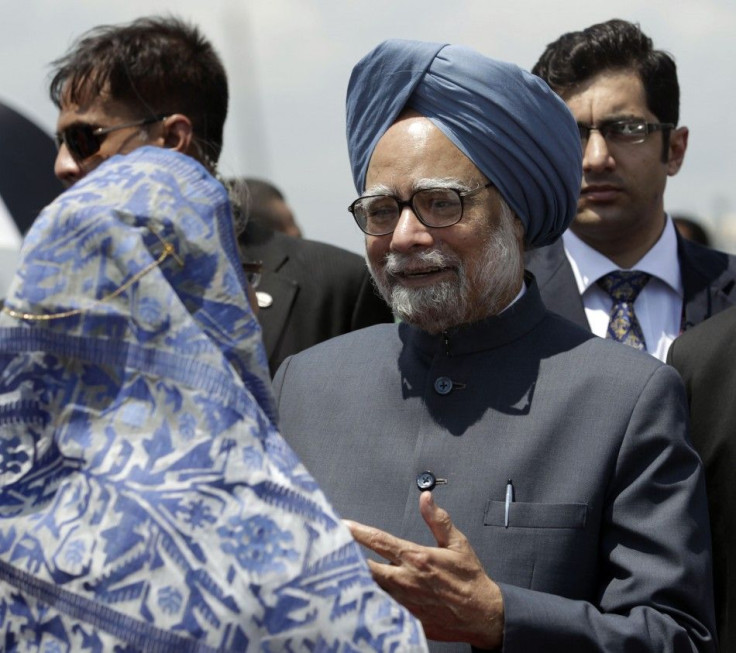Singh Visit to Bangladesh Brings Slight Progress

Indian Prime Minister Manmohan Singh and his Bangladeshi counterpart Sheikh Hasina signed a series of agreements in Dhaka Tuesday, but failed to resolve their main disputes, over transit rights for India and the sharing of river waters, officials said.
Singh arrived in the Bangladesh capital with a large entourage of ministers and officials, for a visit billed historic and insightful, raising hopes that all or most of the long-standing issues of contention between the neighbours would be resolved.
He met the Bangladeshi prime minister in the afternoon but officials of both countries were already saying deals on key issues may remain open for further negotiations.
The two countries have struggled to establish good ties ever since India helped its eastern neighbour to emerge as independent Bangladesh in 1971 from what was then East Pakistan.
Ties have also suffered over recent years because of Indian worries Islamist militants were using Bangladesh as a base.
Bangladesh and India Tuesday signed a comprehensive framework agreement on bilateral cooperation, a protocol on land boundaries, memoranda of understanding on renewable energy and conservation of the Sundarban mangrove forests, home of the Royal Bengal tigers, officials told reporters.
An addendum was also signed to facilitate overland transit to Nepal so Bangladesh can transport goods to the land-locked Himalayan state using a small patch of Indian land, they said.
India also agreed to allow duty-free access to 46 types of garments from Bangladesh to the Indian markets, with immediate effect, which Bangladeshi businessmen termed a long-awaited achievement.
Officials in India and Bangladesh earlier said a deal to share water from two rivers - the Teesta and the Feni - that flow from the Himalayas through India and Bangladesh to the Bay of Bengal looked unlikely during Singh's visit because the government of West Bengal refused to agree.
Even if a deal was initialled by Singh and his counterpart, Prime Minister Sheikh Hasina, the endorsement of the West Bengal Chief Minister Mamata Banerjee was essential for its implementation, they said.
U-TURN BLAMED
There was also no agreement on an Indian request for transit rights through Bangladesh for India's land-locked northeastern states. Dhaka said that deal may not be possible if India did not sign the water sharing agreement, they said.
Singh told reporters after the talks that substantial progress has been made on sharing water of common rivers and need further discussion to see it does not create obstacle to either country.
Bangladesh has expressed frustration and dissatisfaction over Mamata's sudden U-turn that kept the two countries from signing two very crucial deals.
But Bangladesh would allow India to use its Chittagong and Mongla ports from next year to supply its northeastern states, Finance Minister Abul Maal Abdul Muhith has said.
Bangladesh opposition leader Begum Khaleda Zia opposes giving India a corridor and the right to use the ports because she feels it would give India an upper hand over Bangladesh. Singh is due to meet Khaleda on Wednesday.
Hasina visited India early last year. Singh's visit, which ends on Wednesday after the meeting with the opposition leader and a speech to Dhaka university, is the first by an Indian prime minister to Bangladesh in 12 years.
Analysts say India wants a lasting, stable relationship with Bangladesh, an emerging economy and big market for Indian goods, no matter who rules in Dhaka.
Bilateral trade has grown steadily but remains heavily in India's favour, with the gap widening, causing concern in Bangladesh where businesses are asking for the removal of both tariff and non-tariff barriers.
Singh said the duty free access for readymade garments -- Bangladesh's main export -- was aimed at reducing the trade imbalance.
But Bangladeshi economists and analysts say a pact on the sharing of water from the Teesta and more than 50 other common rivers is most important for downstream, agrarian Bangladesh.
Abu Ahmed, a professor of economics at the Dhaka University, said New Delhi had been hostage to the whims of Mamata Banerjee and the lack of agreement on the rivers would dampen hopes for closer ties.
© Copyright Thomson Reuters 2024. All rights reserved.





















